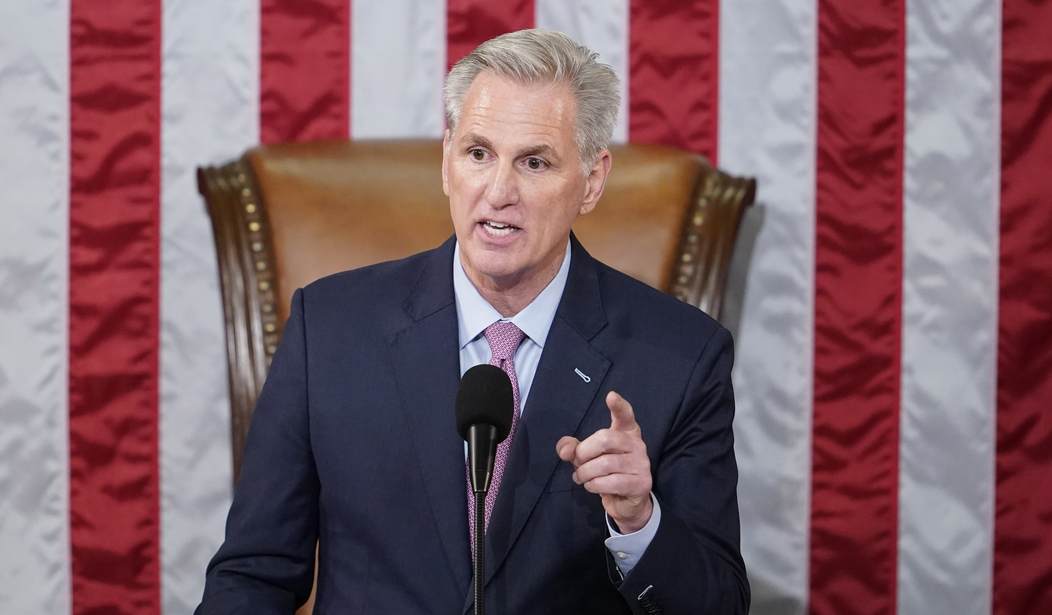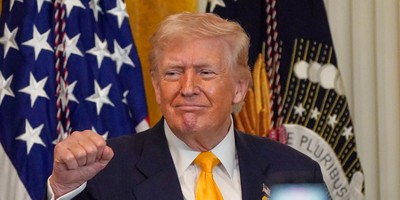A week after meeting with President Joe Biden and other congressional leaders, House Speaker Kevin McCarthy (R-CA) once again met with the president to discuss debt ceiling negotiations. The leaders had scheduled a follow-up meeting for last Friday, though it had to be rescheduled. There is perhaps some cause for hope. The president looks to be cutting his overseas trip so as to address the pressing matter of not allowing the country to go into default, as Spencer covered earlier on Tuesday. It's not after some confusion, though, and on a timeline that McCarthy is reminding doesn't exactly give him a great deal of optimism.
McCarthy began his Tuesday afternoon press conference by indicating "we're a long way apart," though he explained that one such new update is the Office of Management and Budget Director Shalanda Young and White House counselor Steve Ricchetti will lead talks with Rep. Garret Graves (R-LA) and McCarthy's staff as they continue to work on negotiations.
"We've a short time frame here to try to find out how we can come to agreement," McCarthy explained.
"The president agreed to appoint a couple of people from his administration to sit down and negotiate directly with my team, so I found that to be productive, personally. But we’ve got a lot of work to do in a short amount of time," he had also said to the press earlier, right after the meeting. He also referred to "the structure of how we negotiate" as one that "has improved" and "now gives you a better opportunity."
Not only is there such a short amount of time left, but the president could have worked harder and sooner. "I wish we had done this back in February. I requested then, let's sit down and meet, it took the president 97 days," McCarthy reminded when it comes to the lack of urgency from this administration.
"He and Schumer thought people just want to raise the debt ceiling without looking at it," McCarthy continued, speaking of Biden and Senate Majority Leader Chuck Schumer (D-NY), also reminding the press he has repeatedly raised concerns about how the nation cannot afford to keep raising the debt limit.
Recommended
McCarthy went on to tout the House Republican plan--the only plan there's been to actually raise the debt ceiling and avoid default--for its provisions to grow the work force by having work requirements, help supply chain and energy costs, as well as permitting reforms and return the unspent COVID funds to taxpayers.
"Only in Congress would it be up for debate of whether, with the pandemic over, billions of dollars you already appropriated, that people have not spent for two years, to pull that back and give it back to the hard-working taxpayer of America. I don't see how that's even debatable, but only in Congress do Democrats think they have a hard time doing that," McCarthy specified about the COVID funds provision.
Polling last month from the Senate Opportunity Fund showed strong support for the House Republican plan. One particular area of the plan that enjoys that strong support among all political ideologies is "Returning still unspent COVID relief money to the U.S. Treasury." Seventy-five percent of respondents support this idea, which includes 65 percent of liberals, 71 percent of moderates, and 86 percent of conservatives.
The bill also looks to limit spending for the future. It's worth emphasizing, as Spencer has highlighted before, that the House Republican plan Democrats have vilified so greatly, including and especially the Biden administration, merely returns spending levels back to what they were in FY2022, something Democrats were all too happy to cheer on at the time.
The small sense of hope that McCarthy appears to have, is that they look to be making progress, though the timeline is nevertheless concerning. "That doesn't mean we're going to get to an agreement, all it means is I think the process is a better process," which McCarthy again reminded is "something I've been requesting for a long time, that gives us a structure to actually be more productive, but a short time frame to get it done."
McCarthy had made similar remarks beforehand. "If this was where we were in February, I’d be very optimistic," he had said, also having made the case that "it is possible to get a deal by the end of the week. It’s not that difficult to get to an agreement."
He made clear during Tuesday's press conference that he is "not more optimistic."
I'm willing to meet again today and continue meeting until we get this done. https://t.co/vnvPQ59jwR
— Kevin McCarthy (@SpeakerMcCarthy) May 16, 2023
Treasury Secretary Janet Yellen warned earlier this month that the date for default is June 1, now just a little over two weeks away. McCarthy has stated that he trusts Yellen when she mentions such a date.
McCarthy on debt ceiling. Says he trusts Yellen to give them the accurate date of a possible default pic.twitter.com/JcC7mAX8ud
— Chad Pergram (@ChadPergram) May 16, 2023
On Tuesday night, Biden was delivering remarks at an event for Jewish American Heritage Month. The official White House account, though, did tweet out a more optimistic message about the negotiations, mentioning the president's desire to "check in with leaders later this week by phone."
This afternoon, President Biden hosted Leader Schumer, Leader McConnell, Speaker McCarthy, and Leader Jeffries in the Oval Office for a productive and direct meeting about the need to ensure America does not default on its debt for the first time in our history, and on a budget… pic.twitter.com/On2CFTm92H
— The White House (@WhiteHouse) May 16, 2023

























Join the conversation as a VIP Member